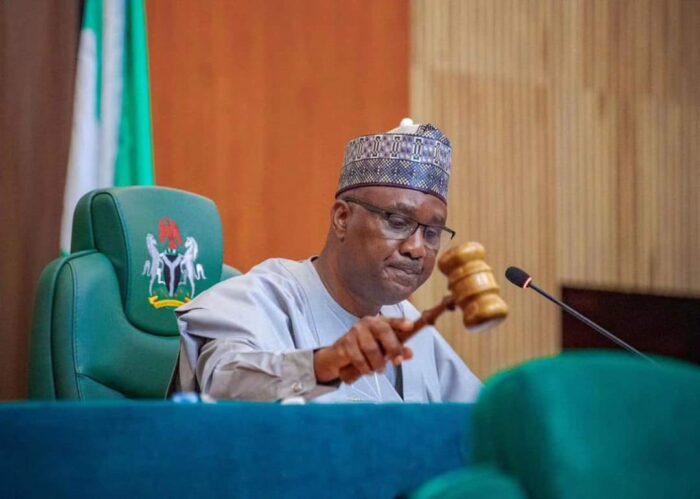The House of Representatives has opened a high-stakes public hearing on a bill seeking to amend the Nigeria Police Act 2020 and cement a mandatory minimum of 15% female representation in police recruitment.
Declaring the session open, Speaker Abbas Tajudeen described the bill as a transformative piece of legislation aimed at building a police institution that mirrors the diversity and realities of modern Nigeria. He warned that the persistent under-representation of women, particularly in leadership roles, has long undermined professionalism and denied many victims of sensitive crimes the empathy and support they deserve.
“This is not just about gender equality. It is about justice, fairness, and strengthening policing through the unique perspectives female officers bring,” Speaker emphasised.
Research, he added, consistently shows that police services with strong female participation record fewer incidents of excessive force, excel in managing gender-based violence, and generally earn greater public trust.
The proposed amendment introduces a gender-responsive compliance framework that would shape recruitment, training, posting, discipline, and career progression. It also mandates the creation of a monitoring unit within the Force to track records and enforce compliance across commands nationwide.
Committee Chairman: ‘We Must Remove the Barriers Holding Women Back’
Chairman of the House Committee on Police Affairs, Abubakar Makki Yalleman, said the amendment aims to dismantle the cultural and institutional obstacles that have discouraged women from joining the Force for decades. Women, he noted, often show exceptional strength in handling domestic violence, sexual assault, and other sensitive cases.
“This reform prioritises recruitment, promotion, and a workplace environment that supports female officers,” Yalleman said. “It will inspire young girls to see policing as a profession where they can rise and lead.”
Women Affairs Committee: Calls for Higher Quota—Up to 30%
Chairman of the House Committee on Women Affairs, Kafilat Ogbara, stressed that the bill addresses longstanding discrimination and performance gaps created by systemic exclusion. Citing global best practices, she argued that women’s contributions to intelligence, diplomacy, and community engagement remain irreplaceable.
While the bill proposes 15%, Ogbara revealed that several stakeholders at the hearing pushed for a more ambitious target, 20% to 30% female recruitment, to reflect Nigeria’s international obligations and improve the credibility of the country’s security architecture.
“We are far behind, and the world is moving ahead. For Nigeria to strengthen its global standing, we must fix the gender imbalance in our security institutions,” she said.
Ministry of Police Affairs: ‘This Reform Is Overdue’
Representing the Ministry of Police Affairs, Okorie Innocent Kalu delivered a strong endorsement of the amendment, noting that the Ministry has already begun eliminating discriminatory entry requirements such as restrictions on marital status, pregnancy, dress codes, and duty assignments.
He listed ongoing reforms that include maternity policies, grievance mechanisms, integration of gender policy into the Force, and the restructuring of the Inspector-General’s office to include human rights and women-and-children protection units.
“The bill will give life to these reforms,” he said. “Anything that makes women more visible in policing will receive the Ministry’s full support.”
Voices of Stakeholders: Women With Disabilities Demand Inclusion
Founder of the Network of Women With Disabilities, Lois Auta, urged lawmakers not to overlook women and girls with disabilities. She called for at least 5% of the proposed 15% quota to be reserved specifically for them, alongside the creation of disability-inclusive desk officers, monitoring systems, and data-tracking units.
“We want our voices and experiences reflected in policy and policing,” she said.
National Human Rights Commission: ‘Discrimination Must End’
The National Human Rights Commission praised the bill, recalling recurring complaints from female officers over discriminatory rules around pregnancy, marriage, and promotion. The Commission highlighted Nigeria’s obligations under CEDAW, the African Charter, and the Maputo Protocol, urging lawmakers to ensure strong oversight and adequate funding for the proposed compliance unit.
Civil Society Groups: Push for Leadership Quotas, Training, and Safer Reporting Channels
Various groups, including the Women Advocate Research and Documentation Centre (WARDC), Women Against Violence and Exploitation Foundation, proposed additional safeguards such as: extending gender quotas to promotions and leadership positions, establishing a dedicated gender and human-rights compliance department.
They also called for mandatory gender-sensitivity and trauma-response training, confidential reporting systems to protect officers from retaliation, and partnerships with civil society for external oversight.
The CSO’s lamented that women constitute only 10–12% of the Nigeria Police Force, far below global standards. They argued that increasing female participation will improve professionalism, community trust, and investigative outcomes.
In closing, Deputy Chairman of the Committee, Dr. Amadi, thanked all stakeholders, noting that public hearings remain one of the most powerful elements of Nigeria’s democratic process.
“If the people had rejected this bill today, it would not move forward,” he said. “It is Nigerians who ultimately make the laws.”
With the overwhelming support of stakeholders, from ministries to civil society, human rights bodies, and security experts, the amendment now advances to the next legislative stage, raising hopes for a more inclusive, accountable, and gender-responsive Nigerian Police Force.


